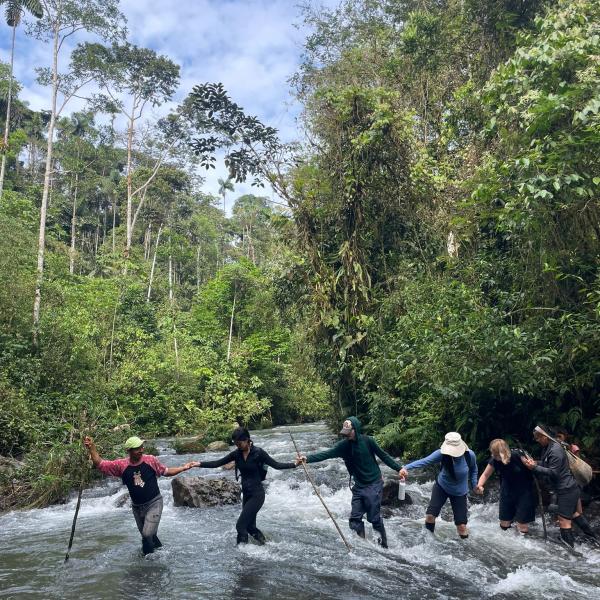Overview
Fall 26 second round rolling applications until deadline or full.
Learn more about the application process and deadlines for each round of applications.
SIT offers two unique programs in Nepal
Development, Gender, and Social Change in the Himalaya
Witness the challenges Nepal faces in balancing tradition and progress and negotiating economic, political, and social change during a dynamic period in its history.
- See how international development, political conflict, emerging civil society, and global markets are redefining the country
- Understand climate change and environmental concerns in the Himalayas
- Examine ethnicity, nationhood, and social and political change
- Identify causes and conditions for change and conflict
- Learn how caste, class, gender, and religion in Nepal are at play in peoples daily lives and political futures and explore the forces of change and stability
- Learn about organic farming, women’s roles in agriculture, and food security
- Engage in fieldwork with villages focusing on ecotourism and social entrepreneurship along trekking routes in the high Himalaya
- Develop competency in Nepali through intensive daily instruction
Learn about Tibetan and Himalayan politics and religion and the issues faced by communities in exile.
- Learn about the schools of Tibetan Buddhism, Newar and Theravadin Buddhist traditions in Nepal, religious tourism and pilgrimage, and meditation and retreat
- Go on a high-altitude trek in the Himalayas to visit isolated Tibetan communities. Travel to India, Bhutan, and/or the Tibetan Autonomous Region in China (conditions permitting)
- Explore varieties of beliefs and practices among different groups of Himalayan people
- Develop an understanding of the politics inherent in processes of everyday life in an exile community
- Explore cultural transformation and preservation, identity and social change, religious revival, and regional geopolitics
- Discover contemporary Tibetan and Himalayan society, sciences, and arts
- Learn the Tibetan language and, if you choose, Nepali
Why study Development and Social Change in Nepal?
Between the high Himalayas and the jungle flood plains is the middle hills region of Nepal, but only in Nepal would these mountains be called “hills.” Often seen as the traditional source of Nepali culture, the middle hills contain natural and cultural diversity. Traditional towns are changing from way stations along Himalayan trade routes into modern administrative centers. Amidst terraced fields, the dynamics of tradition and modernity are at play, and the results of development and changing social relations are visible. Witness how international development, political conflict, emerging civil society, and global markets are redefining the country. Learn from influential experts in the development arena. Develop competency in Nepali through intensive daily instruction. Explore the Kathmandu Valley and its UNESCO World Heritage sites.
Why go to Nepal to study Tibetan people and culture?
Through SIT’s well-established regional networks, you will enjoy unique access to restricted regions. This access has already created remarkable firsts for SIT students. They’ve brought back what appear to be the first-ever photos of saint, yogi, and poet Milarepa’s birthplace, Kya-nak-tsa in Gungthang, and photos from the tower he built for his guru, Marpa the Translator. Other students photographed a snow leopard in western Nepal.
Nepal is the site of the birthplace of Siddhartha Gautama, the Buddha. Lumbini in the southern Terai region is one of the holiest places of one of the world's great religions, and its remains contain important evidence about the nature of Buddhist pilgrimage centers from as early as the 3rd century BC. It is now a UNESCO world heritage site.
How do I choose among programs?
- See the Office of Global Learning’s “Selecting a Program” page for information on program types and considerations
- Use the search features on the Experience Cornell Opportunities page to filter for programs approved by your college, and by particular subject areas
- Go to the “Get Advice” page for information on drop-in advising hours, scheduling an advising appointment, returned student contacts, and college advisors for study abroad
- Find out about upcoming events, check out FAQs, and read stories from returned study abroad students
How do I apply?
Applying to study abroad is a two-step process. For more information, visit Apply for Semester and Year on the Education Abroad website.
For Cornell Approval, click on the "Apply" button on this webpage. Applications are reviewed by Education Abroad. See timeline. Students who secure a space follow Step 2.
For Program Admission, complete an external application directly on the program’s webpage, using the link in the “Snapshot” section on this page by the external deadline. (Note: This deadline will differ from the general Cornell deadline for approval.)






